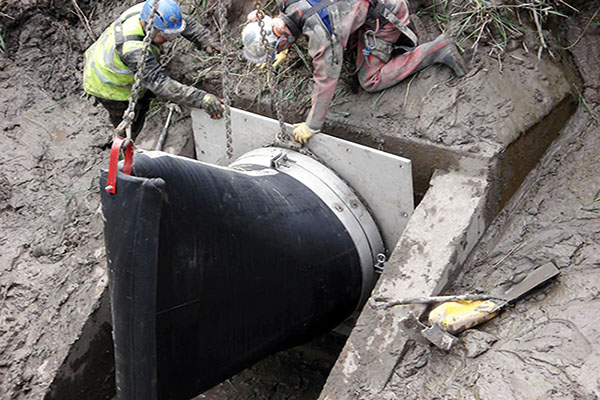Never Get Stuck in the Mud with a Tideflex® Check Valve
 Stormwater discharges to the tidal section of the Parrett River in Bridgewater (a town located in Somerset County, England) were constantly blocked due to mud and silt settling in metal flapgate valves, causing them to frequently malfunction, leading to significant backflow problems.
Stormwater discharges to the tidal section of the Parrett River in Bridgewater (a town located in Somerset County, England) were constantly blocked due to mud and silt settling in metal flapgate valves, causing them to frequently malfunction, leading to significant backflow problems.
Bridgewater and its surroundings have a history of flooding due to overflow of the existing combined systems, especially in heavy rainfall events. The area of Bridgewater to the east of the river is designated as Flood Zone 3a in the Sedgemoor District Council Level 1 SFRA, which means it has a high probability of fluvial and tidal flooding. Substantial work has been done over recent years to remedy this situation, including the construction of several stormwater tanks in 2005. The largest of these tanks (2350 m3) is connected to the Taunton Road Pumping Station (rated at 700 l/s) which discharges to the Parrett River on the west bank between two bridges in the middle of Bridgewater. Water levels in the river are determined by the tidal variation within the Bristol Channel at the mouth of the river, which has one of the greatest tidal ranges of any river in the world. The tidal influence extends approximately 10km upstream from Bridgewater.
Despite dredging and de-silting work carried out on the river, the volume of mud and silt in the river continues to be an issue for outfalls on its banks. In fact, the two outfalls in this project required significant effort to be cleared of mud before work could begin on replacing the non-functioning flap gate valves.
The local water authority decided that a Tideflex® TF-1 Duckbill Check Valve would provide the longest-lasting, maintenance-free solution to the problem, based on the valve’s proven track record in being free-draining and self-clearing. For nearly 40 years, no other check valve has matched the Tideflex® TF-1 Check Valve’s proven ability to consistently and reliably function, even when covered in significant amounts of mud and other debris. In an area prone to flooding, it is more important than ever that every part of the drainage system functions as intended in the long term.
As a result, 1200mm and 1000mm Tideflex® TF-1 Valves were clamped to thimble plates bolted on concrete headwalls on the banks of the Parrett River. The TF-1’s specialty elastomer construction proved to be an excellent choice for this outfall application. The Tideflex® Valves continuously clear themselves passively, even when buried in tightly packed mud and silt. The Tideflex® Valves operate on differential pressure; forward flow opens the valve and reverse flow/backpressure seals the valve, requiring no external energy. These valves will provide the water authority a long service life with virtually no maintenance.
Today, there are thousands of Tideflex® Duckbill Check Valves installed around the world, many that have been in service since 1984 and thousands of marine installations that have been in service for well over 25 years. The Tideflex® Duckbill Check Valve will never corrode in salt water, will not freeze in winter, and will not stick open or shut like a flap gate.

